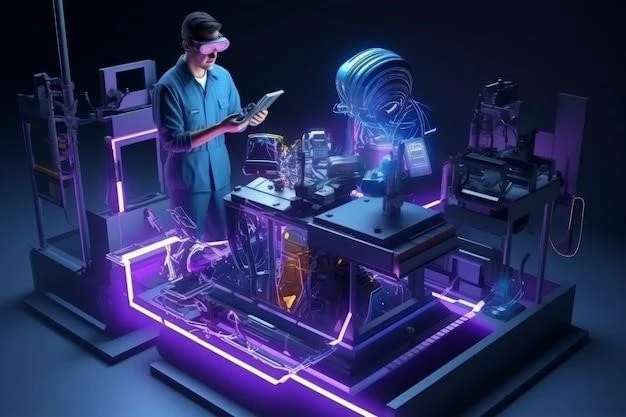AI-Driven Drug Discovery: Revolutionizing the Pharmaceutical Industry
The pharmaceutical industry is undergoing a transformative shift driven by the advent of artificial intelligence (AI). AI-driven drug discovery‚ leveraging the power of machine learning and computational algorithms‚ is emerging as a game-changer‚ accelerating drug development and potentially revolutionizing the way new therapies are discovered and brought to market.
The Traditional Drug Discovery Process: A Lengthy and Costly Journey
Traditionally‚ drug discovery has been a lengthy and expensive process‚ often taking years and billions of dollars to bring a new drug to market. This process involves several stages:
- Target Identification: Identifying the biological target involved in a disease.
- Hit Identification: Screening large libraries of chemical compounds to find potential drug candidates.
- Lead Optimization: Modifying the structure of promising candidates to improve their potency‚ selectivity‚ and other properties;
- Preclinical Testing: Testing the drug candidate in animal models to assess its safety and efficacy.
- Clinical Trials: Conducting human trials to confirm safety and efficacy in different populations.
- Regulatory Approval: Submitting data to regulatory agencies for approval to market the drug.
This complex process is often hampered by various challenges‚ including:
- Limited success rate: The majority of drug candidates fail during clinical trials‚ leading to high costs and wasted resources.
- Time-consuming process: The entire process can take several years‚ delaying access to potentially life-saving therapies.
- High costs: The financial investment required for drug development is significant‚ often exceeding billions of dollars.

AI-Driven Drug Discovery: A Paradigm Shift
AI-driven drug discovery offers a promising solution to these challenges by automating and accelerating various stages of the drug discovery process. Here are some key ways AI is transforming the pharmaceutical industry:
1. Target Identification
AI algorithms can analyze vast amounts of biological data‚ including genomic sequences‚ protein structures‚ and disease pathways‚ to identify potential drug targets. This data-driven approach allows for the identification of novel targets that might have been overlooked using traditional methods.
2. Hit Identification and Lead Optimization
AI-powered virtual screening tools can rapidly analyze millions of chemical compounds‚ identifying potential drug candidates that bind to specific targets. Machine learning models can then optimize the structure of these candidates to enhance their properties‚ such as potency‚ selectivity‚ and pharmacokinetic profile.
3. Preclinical Testing
AI can be used to predict the efficacy and safety of drug candidates in preclinical studies. By analyzing data from previous clinical trials and animal studies‚ AI models can identify potential toxicities and predict the likelihood of success in human trials.
4. Clinical Trial Design and Patient Selection
AI can help optimize clinical trial design by identifying the most relevant patient populations and selecting the appropriate endpoints for evaluating the drug’s efficacy. Machine learning models can also analyze patient data to identify subgroups that are more likely to respond to a particular treatment.
5. Drug Repurposing
AI can be used to identify existing drugs that may be effective for treating different diseases. By analyzing drug-target interaction data and disease pathways‚ AI algorithms can suggest potential drug repurposing opportunities‚ accelerating the development of new therapies.

Benefits of AI-Driven Drug Discovery
The adoption of AI in drug discovery offers numerous benefits‚ including:
- Increased Success Rate: AI-powered tools can identify more promising candidates‚ leading to a higher success rate in clinical trials.
- Reduced Development Time: AI accelerates various stages of the drug discovery process‚ reducing the time required to bring new therapies to market.
- Lower Costs: By automating and optimizing processes‚ AI can significantly reduce the overall cost of drug development.
- Enhanced Precision and Efficiency: AI algorithms can analyze data with greater precision and speed‚ leading to more informed decisions and improved efficiency.
- Discovery of Novel Therapies: AI can identify new drug targets and repurpose existing drugs‚ expanding the range of therapeutic options available to patients.
Challenges and Ethical Considerations
While AI holds immense promise for drug discovery‚ there are also challenges and ethical considerations that need to be addressed:
- Data Availability and Quality: The success of AI relies on access to large‚ high-quality datasets‚ which may not be readily available for all disease areas.
- Model Interpretability: It is crucial to understand how AI models make predictions to ensure their reliability and transparency.
- Bias and Fairness: AI models can perpetuate biases present in training data‚ which could lead to unfair outcomes in drug development and access.
- Job Displacement: The automation of certain tasks by AI may lead to job displacement within the pharmaceutical industry.
Future Outlook
The future of AI-driven drug discovery is bright. As AI technology continues to advance and datasets grow‚ we can expect even more transformative advancements in drug development. AI-powered tools will play an increasingly critical role in identifying new targets‚ designing novel drugs‚ and accelerating the delivery of life-saving therapies to patients around the world.
The adoption of AI in drug discovery presents a unique opportunity to address some of the most pressing challenges facing the pharmaceutical industry. By embracing this technology‚ we can unlock new possibilities in drug development‚ accelerate the discovery of novel therapies‚ and ultimately improve patient outcomes.










